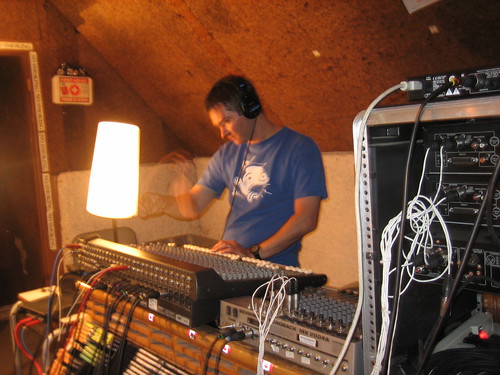Abstract Index playlist - Jul 12/06

This week's disc isn't a perfectly realized moment of brilliance, but it's got a lotta soul. Harry Miller is best known as the bassist for Chris McGregor's Brotherhood of Breath, a British big band which lasted for about 20 years from the late 60s onward until Mcgregor's death in 1990. Their core was composed of South African exiles who managed to bridge Ellington, Ayler and kwela music seamlessly. They evolved from the Blue Notes, a mixed race band that came together in the 50s, and suffered from the hardening of apartheid laws in the early 60s. Once they were invited to play in Europe, they never looked back, and did not return for many years.
The most active members in London were pianist Chris Mcgregor, Dudu Pukwana on alto, Miller on bass, Mongezi Feza on trumpet and Louis Moholo on drums. The latter three players are all featured on this disc, recorded by Radio Bremen in November 1975, only a month before Feza died of pneumonia while mistakenly committed to a mental institution. His playing is the best part of this disc - like the smoothest and most articulate 60s Miles in spots, only to outfox Don Cherry in others. Miller and Moholo are dynamic together, a strong undercurrent of funk only underlined by the kwela changes. Keith Tippett handles the piano chores and whether comping or soloing, he adds so many different colours to the head-solos-head structures of each of these lengthy pieces.
Miller's Ogun Records, still run by Hazel Miller, was the label which released the greatest amount of South African/British jazz, often in collaboration with other great European improvisers like Evan Parker, Elton Dean and Lol Coxhill. This turned out to be very important as all the South African improvisers save Moholo, died before their mid fifties, under-recognized to say the least.
Whereas Derek Bailey may have coined "non-idiomatic improvisation" which continues to inspire musicians seeking new languages from their instruments, the South Africans wore their idioms on their sleeves. It was profoundly joyful and angry, culturally specific and universal all at once. So many British players were inspired personally and professionally by their music. Robert Wyatt said: "Somehow, those South Africans had discovered by the mid-60s how to combine song and dance with all the new ideas that were coming through free-jazz at the time. It was like a kind of free dance. I hadn't believed that was possible before. They filled a vacuum of meaning in music for me after [John] Coltrane died in 1967. They had that accessible soulfulness you associate with black popular music, but with the edge of something new being made."
Thanks to Cuneiform Records for keeping the spirit alive!
family affair - isipingo (cuneiform)
comparsa de los locos - eddie palmieri (tico)
here we go again - wayne mcghie (light in the attic)
zalim - edip akbayram (shadoks)
mume wangu - orchestra makassy (arc)
boulmanyie - orchestra baobab (sterns)
cloud nine - bill hemmans and clay's composite (sss)
evening dance - lubo alexandrov (enja/justin time)
the tortoise - frequency (thrill jockey)
quebec on my mind - billy robinson (do right)
ka anyi jifota - chief stephen osita osadebe (rough guides)
bolero somnulabo - manual galban & ry cooder (nonesuch)
martin denny - sex mob (thirsty ear)
living in the ghetto - jezzreel (wackies)
you like to borrow - john clark (wackies)
new broom pt. 2 - new establishment (studio one/heartbeat)
green guava - lord tickler (pressure sounds)
captain of the ship - sugar minott (blood and fire)
away with the bad - glen brown (shanachie)
fire coal version - sound dimension (studio one/heartbeat)
Labels: Brotherhood of Breath


0 Comments:
Post a Comment
<< Home